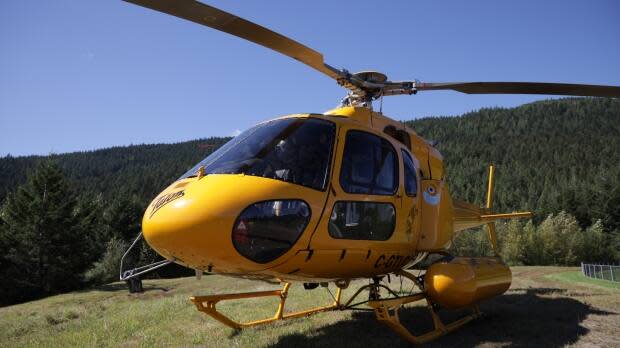Canadian helicopter operators in tailspin due to pandemic and a slow fire season
Canadian helicopter operators have been hit the hardest in an aviation industry "devastated" by the pandemic and the economic downturn, says the president of the Helicopter Association of Canada.
Physical distancing restrictions, a slow fire season and slumping economy have parked a lot of helicopters, he says.
"Aviation generally has been devastated by the pandemic, but the helicopter industry in Canada has been particularly hard hit," said Fred Jones, the president of the association.
Helicopter biz not for 'faint of heart' but this is a harsh blow
Jones said about 40 per cent of the 100 or so Canadian operators — are now vulnerable to shutting down.
That is because the pandemic has slowed tourism, rain slowed the fire season and less demand left the oil-and-gas sector in a slump.
Add skyrocketing insurance rates, and that has put helicopter operators in a tailspin. Helicopter piloting can be precarious.
"It's never been a business for the faint of heart," said Jones. "But this combination of factors is a harsh blow."
The wet fire season really hurt a lot of operators.
Last year, wildfires ravaged 1.3 million hectares.
But, this year, overall fire activity is well below the 10-year average, according to B.C. Wildfire Services.

Since mid-March, Jones said 18 commercial operators have lost their licences or let them lapse.
Jones said that's a concern because helicopters deliver essential services from cliff rescues to supply deliveries into remote, often Indigenous communities.
Helicopters offer access to rugged, inaccessible spots in Canada.
'Miserable' year for helicopter operators focused on firefighting
More than 70 per cent of the helicopter association's members are based in Western Canada. Helicopters are also used for oil and gas exploration, mining, firefighting, medical rescue and the film industry.
Pilots also shuttle tourists from cruise ships and others to ski resorts or fly-in fishing lodges. But many operators rely at least in part on firefighting work.

Jacob Forman is CEO of Yellowhead Helicopters based in Valemount B.C. His company operates 36 helicopters from a dozen bases in B.C. and Alberta for many industries from mineral exploration to forestry.
"We were lucky we were able to pivot," said Forman.
Other operators did the same, branching into aerial photography or forest surveying.
"If your company did nothing but fight fires, you probably had a miserable year," said Forman.
Grounded helicopters will have an impact, according to a report done in 2016 by the industry.
Each helicopter operating in Canada generates an estimated $240,000 a year in wages and contributes about $1.1 million to the Canadian economy.
The $2-billion helicopter industry in 2016 employed more than 6,200 people from mechanics to ground crew and pilots.
But in the current economic climate, industry analysts say operators are in trouble.
Many say they are pinning their hopes on the emergence of a quick-turnaround COVID test, so that borders can reopen, bringing in last-minute heli skiers or fly-in fishing lodge traffic.



